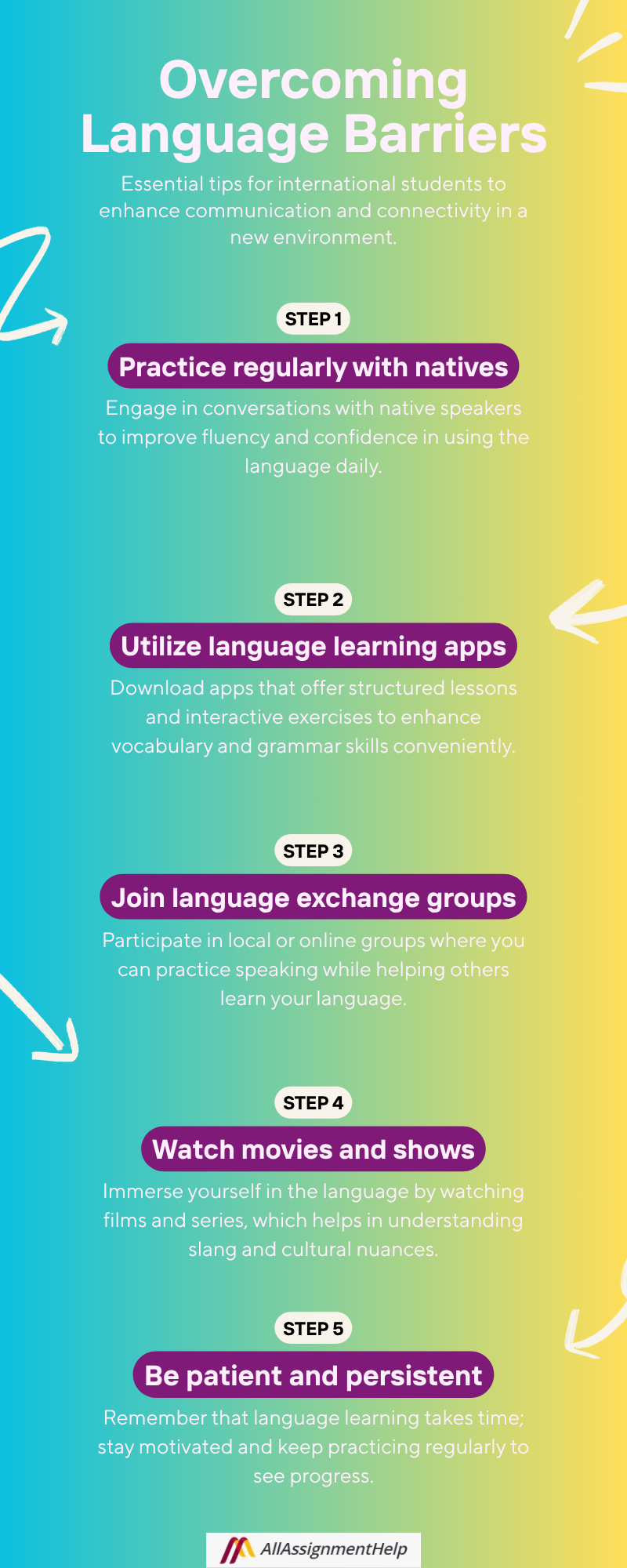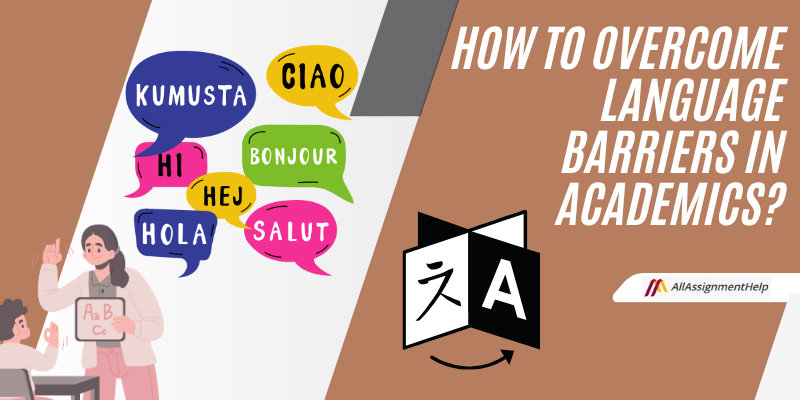Table of Contents
Studying abroad allows you to grow academically and experience a diverse range of cultures. Nevertheless, overcoming language barrier is one of the biggest obstacles to studying abroad. Social relationships, general well-being, and academic achievement can all be impacted by language limitations. We should be extremely grateful for the fact that we have more opportunities than ever before to interact with individuals around the globe! But one unavoidably annoying side consequence is encountering language obstacles more often.
Even publishing research in English has become increasingly important as the world’s academic environment becomes more interconnected. But creating and publishing scholarly works in English presents a special set of difficulties for non-native writers. The following piece, curated by allassignmenthelp, tries to explore the basic problems encountered by foreign students and offer some solutions as well.
Read More: The Best Study Spots in Washington, D.C. for Students
What Is a Language Barrier?
Any communication limitations that cause miscommunications between persons are known as language barriers.
In general, there are two primary types of linguistic barriers:
1. Linguistic barriers: difficulties in understanding and directly translating words and phrases between languages.
2. Cultural barriers: difficulties extend beyond simple language translation and include social conventions, customs, values, and contextual awareness.
Communication is often hindered by linguistic disparities. Translating words and phrases is necessary to ensure that messages are understood. Cultural differences are a second-level barrier to communication that hinders people’s ability to connect.
This language barrier can hamper your studies, which can ruin your entire efforts. But you don’t need to worry, many foreign students opt for online assignment help services. These services are designed to support students who struggle with English, ensuring their assignments meet academic standards. With professional guidance, you can better understand complex concepts, improve your writing skills, and meet tight deadlines without stress.
Why Is Proficiency in Language Important?
When it comes to bringing people together globally, language is essential. Language serves as a bridge in the context of studying overseas by relating students to both their academic endeavours and the larger cultural environment.
Proficiency in the English language becomes essential when planning to study overseas since it enables people to establish enduring relationships and promotes efficient communication during the academic process. Imagine completing academic assignments in a language you don’t know, taking part in group discussions, and attending intricate lectures. Hence, students who possess a strong grasp of the four fundamental language skills: speaking, reading, writing, and listening, are better able to participate in their coursework and achieve exceptional academic success.
However, if you’re struggling to keep up with your coursework due to language difficulties, you can always ask an expert to take your online class for you. Many international students choose this option to stay on track with their studies and maintain their academic performance while they continue improving their language skills.
Read More: How to Write an Appendix: Format, Examples, and Tips
Tips To Overcome Language Barrier As An International Student
If you are studying abroad in a country where the majority of people do not speak your mother tongue, there is a significant chance that you will run into language issues. Regional dialects, slang, out-of-date terminology, and other obstacles will arise regardless of how long you have been learning the language of your host country. As soon as someone hears announcements in their language, they start to struggle with communication in an unfamiliar environment, especially in a country where English is not the primary language. They may feel as though they are missing important knowledge or get perplexed and puzzled as a result.
Students especially suffer the most as they are unable to understand the teacher’s language and communicate with their classmates. Thus, they feel left out. This is why in this section of the blog, we will explore the tips and techniques to deal with a language barrier:

Find out and address language needs
The first step in helping students who are experiencing language problems is to identify and meet their unique language needs. Assessments of language proficiency, feedback, and specialised support services can all help achieve this. Language assessments can assist teachers and students in identifying their strengths and shortcomings in a variety of language abilities, including speaking, writing, listening, and reading. Feedback can help students become more confident, accurate, and fluent speakers. Mentoring, workshops, online resources, and language tutoring are examples of support services.
Accept the Process of Learning
Accepting the learning process is the essential step towards overcoming language barriers. Recognise that learning a new language requires patience, time, and effort.
Don’t be discouraged because making mistakes is a normal part of learning. Rather, see every error as a chance to get better.
Acknowledge your accomplishments, no matter how minor, and stay inspired by the belief that learning a language will improve your experience overall.
Practice as much as you can
It is among the most crucial methods for breaking through a language barrier. When studying abroad, simply keep talking to overcome language barriers. Learn new words and use them to construct sentences. After that, just record your conversation and play it again. This will make it easier for you to speak the language.
You can also consider enrolling yourself in online English courses to strengthen your fundamental command of the language. These courses not only help you improve fluency but also include a variety of tasks and exercises that enhance your writing skills and overall communication. By actively participating in such courses, you get an excellent opportunity to work on your basics, refine your skills, and become more proficient in the long run.
Most of these courses also offer certification upon successfully clearing their exams, which adds great value to your profile. However, sometimes circumstances don’t allow you to appear for exams despite your best efforts and other commitments. That doesn’t mean you lose the opportunity to earn the certification. Many students in such situations choose to hire online exam helpers. You can simply reach out to online class help services, asking can you take my online exam for me, to get the assistance you need to achieve your certification goals.
Understand the Fundamentals
It might be very difficult to manage your everyday responsibilities and learn a new language. Start early and modestly. Acquire and commit to memory a few essential phrases and vocabulary from that language. On the memory of your phone, put them. Use them as often as you can. It will facilitate your language learning. Learn the words and numbers “yes,” “no,” “please,” “okay,” “thank you,” and “help.” Once you are at ease using these fundamental terms, you will ultimately attempt to comprehend the language.
Create a Network
Making friends in the local community and networking might be useful strategies for overcoming language barriers when studying abroad. They may also provide you with the best tips on how to communicate in their culture. Consequently, this is the best method for improving ordinary conversational abilities while studying overseas.
Read More: 100+ Original Oratory Speech Topics
Learn to Listen Actively
Keep a close eye on the language usage of native speakers. Observe how they pronounce words, how they construct sentences, and what they use in daily life. In both your target language and your native tongue, watch films and television programs with subtitles.
In addition to exposing you to natural speech patterns, this increases comprehension. Subconsciously absorb the rhythm and flow of the language by listening to music and podcasts.
Develop your ability to study on your own
The goal of helping students who struggle with language is to help them develop the self-directed learning skills necessary to be in control of their learning process and results. Helping students create efficient learning techniques, like goal-setting, task planning, time management, progress tracking, and outcome evaluation, can accomplish this. Additionally, teachers should encourage students to look for extra learning opportunities by encouraging them to serve in the community, join groups and societies, and take online courses.
Spend time watching television shows and films
There is no doubt that this is the safest way to start the process. The best way to learn the language is to watch as many films or TV shows as you can. Arguments are a common element in films. Because of this, learning a new language is easy.
Who wouldn’t enjoy watching TV shows and films? It might be better to watch it in the language you are studying. Get to know your local friends and spend some time watching TV in their mother tongue.
Become a member of international student support groups
You are surrounded by other international students. It’s also not just you who has trouble communicating in another language. Beyond your university, there may be government-funded programs, organisations, or NGOs that help international students. For example, they could organise cultural and language classes or other special events, such as a movie night or cooking class, to promote better integration.
Request Assistance
Speak as much as you can in the intended language without fear of making mistakes. Even though it’s not always as easy as it seems, we learn a language by using it. Consult your instructors, local friends, and international student organisations if you require help with your language skills.
If you’re facing challenges with academic subjects like English, Math, or Statistics, you can easily find support online. English assignment help, statistics help, and help with other subjects are also offered by experts online.
Conclusion
Being an international student, it can be very difficult to overcome language barriers, but when you do, it is really worthwhile. You can improve your language proficiency and get the most out of your foreign experience by accepting the learning process, making use of the resources available, practising regularly, interacting with native speakers, and asking for help.
Keep in mind that perseverance and optimism are essential. You will improve your confidence and language skills over time, which will help you succeed academically and enhance your cultural experience.
FAQs
Q1: How can I get better at English before going overseas to study?
A: You can read books, watch English-language media, take online language classes, and practise conversing with native speakers or language partners.
Q2: If I can’t keep up with my online class, is it acceptable to ask someone else to take it?
A lot of students who are having trouble with their online education because of time or language barriers hire professionals to help them.
Q3: Are there any resources available to assist with linguistic barriers?
A: You can get assistance with grammar, translation, and vocabulary via programs like Grammarly, Google Translate, and language-learning applications like Duolingo.
Q4: Will I receive assistance from my university for my language problems?
A: For non-native English speakers, the majority of universities provide workshops, writing centres, and language support services.
